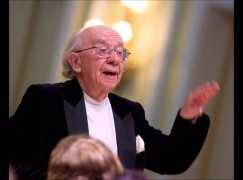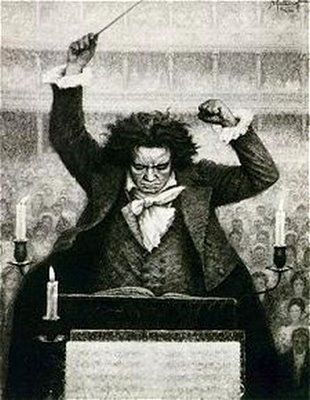Gennady would have been 90
mainNo-one figured out the enigma that was Gennady Rozhdestvensky.
On the one hand he stepped up to head a Soviet Ministry of Culture Orchestra when the others were deemed to be infected with dissidents. On the other, he conducted every new symphony of Alfred Schnittke and when they banned him in Moscow, Gennady put his orchestra on a train and gave the premiere in the boondocks.
A charming, witty companion, he was chief conductor of the BBC Symphony, the Vienna Symphony and Stockholm Phil, skimping famously on rehearsals so he could take his wife shopping. But the concerts lacked nothing in passion and precision.
He was a magician and a very private man.
Gennady who died in June 2018, would have turned 90 this week.
We miss him






Remember a Prom encore with the Leningrad PO where after a minute or so he just stepped off the podium and left them to it!
He always reminded me of Prokofiev. It’s strange how they look similiar!
Lovely man. he told me that he never rehearsed for more than 45 minutes!
He looks happy! What a conversation between
him and the orchestra! Sans paroles.
Thank you!
He is still greatly missed!
I had the privilege of hearing him thrice:
As a fetus – Tchaikovsky 4 with Leningrad Phil.
As a youth – Scriabin 2 with Moscow Phil
In 2016 – Prokofiev 5 with Dresden Phil
That’s a very musical fetus. Great parents you have. I wonder which concert they attended when you were just a twinkle in your father’s eyes?
I have a very nice Rozhdestvensky/Postnikova recording of Brahms’ four-hand piano music on Eurodisc LP 89 152 KK – well worth having if you can find it.
my first set of Shostakovich conducted by him via Olympia.
A witty and wonderful performance
Also two stints at the Royal Stockholm Philharmonic.
I had the chance to see him conduct several different programs in Moscow about 15 years ago. Just wonderful music making, in a range of repertoire most orchestras probably never saw him do as a guest conductor.
He left a BSO engagement when he saw the posters and decided Lynn Harrell’s name was in larger letters than his. He also conducted the BSO in Schnittke’s First Symphony-the number of pseudo doyens rushing to the exits was memorable. RIP.
Spelling his full name took 3X real estate space vs. Lynn’s…
Rozhdestvensky’s concerts in Boston were often highlights of the season. I remember the tremendous performance of Suk’s A Summer’s Tale, a work I knew well from recording, but which was extraordinarily performed by the BSO in what turned out to be the U.S. premiere of the work about 100 years after it was written. A great concert! His Sibelius was excellent, and really, I never heard him give a bad BSO concert. Unlike many, I do think the BSO mishandled the situation with him. And Rozhdestvensy was wrong to walk out as he did. But the fault lies more with the BSO than him. It doesn’t matter anymore. But Rozhdestvensky was a great conductor who had few peers. I loved going to hear his concerts, and I’m sorry his time in Boston came to an end prematurely.
Question to orchestral musicians: how could Rozhdestvensky and Knappertsbusch lead first class performances, often deeply felt, with so little rehearsing?
A good orchestra, where the musicians pay attention, listen to each other, and know their parts very well (including how their parts fit into the whole at any given moment), barely needs a conductor, let alone rehearsals. (Perhaps for rhythmically complicated pieces, or pieces that require huge forces or more than one conductor — or all of the above, like the War Requiem.)
Much of rehearsal is to fix problems with ensemble or balance: either someone can’t tell if they are playing too loud or soft, or they forgot to pay attention and are blaring their whole notes to cover up the quiet melody in the cellos — coughTROMBONEScough — or some such; or, their ears are deceiving them and they can’t tell that they aren’t synchronized with a section that’s all the way across the stage. (For example: I’m a flute player. My part very commonly doubles that of the first violins. On our stage, if I use my ears to synchronize with them, I will be late. I have to use my eyes to synchronize with their bows and fingers. If I forget this, then the conductor has to say something to me about it.)
We recently had a guest conductor who had once conducted the Chicago Symphony. They were doing Ravel’s “Mother Goose” for a children’s concert. She said — I’m paraphrasing; it’s been a couple years — “that orchestra is so on top of things, so present, that they could totally have done it without me… and they knew it. But they would look up at me at all the rubato spots like ‘OK, what do you want to do here?'” She said it was almost like a challenge, as if they were saying “I’m very difficult to impress. Impress me.”
If an orchestra knows a piece well enough, they can do pretty much anything by themselves. (For instance, could the Vienna Philharmonic play Don Juan without a conductor? …I found myself laughing as I tried to imagine them having trouble with this.)
Isn’t the very start of Don Juan a feared pitfall for conductors? I recall Previn telling a story about that.
I am with you, but only up to a point: yes, the VPO, for instance, can play competently without a conductor. But can they play an adagio with spiritual qualities alone? No way.
I heard the VPO many times in the 80s, both at the opera and in concert. Back then I was a student. They could sound like a different orchestra, depending on who was conducting. I remember a concert where Abbado stood in at the last minute for an ailing Karl Böhm. The Brahms 1st symphony sounded mostly generic, except for a blazing finale. Maybe the finale was all Abbado had time to rehearse? Under Karajan, they sounded like under Karajan and, like him or not, unlike under anybody else.
I am incredibly jealous that you had the opportunity to hear the VPO up close for such an extended period! As I’ve learned with my own ears, recordings don’t do them justice. They are in a league of their own these days.
Herr Dr., the extended period gave me the chance to hear the VPO live on top of their game a few times. Those were indeed precious. A lot of the time, especially at repertoire performances at the opera, they gave forgettable routine performances that pushed the anger buttons of my teen self.
A rule of thumb with conductors is “The more they talk, they less we listen.” I think that is true of life in general. If you know the music, and the conductor is clear and expressive of nuance, there is no need to go over things repeatedly.
I read a story recently (people can confirm/correct details): one conductor guesting with a Russian orchestra said “Well I can’t speak Russian but I can speak English, German, French… which would you prefer?” To which the orchestra leader replied “Silence”.
Add in Charles Munch.
Answer: when the conductor knows every note of the score, and has the communication skills to share with the orchestra: head, heart, and something which no one can really describe or analyze. This wonderful conductor did not use a podium (at least when he conducted the NY Philharmonic ): he stood on the floor and when he wanted to tell a particular section something special, he would walk over to them and say a word or two (with a smile, and a twinkle in his eyes). If you notice, in any video of him, the orchestra is looking at him with enjoyment, mesmerized by his expression and seemingly effortless technique. There’s is a great DVD about G.R.
called “The Red Baton.”
Good question. What would Carlos Kleiber muse on this?
Sometimes it’s the conductor who needs to rehearse, not the orchestra.
Something incredibly witty that we could never imagine.
“I did not hear Carlos Kleiber’s Rosenkavalier at the Met. My friend remembers Kleiber instructing the orchestra that the music accompanying the Marschalin must shimmer like chiffon, creating a veil through which this character’s fading beauty could be apprehended.” J. Horowitz
He conducted the Chicago Symphony in the Shostakovich First not long before he died. I value his box of all Shostakovich symphonies with many extra tracks of rarer orchestral works by DDS.
The repeated, dramatic kettle-drum solo in the adagio of the First again seemed an early variant of the composer’s monogram, DDS on the notes C (Do)-D-Es (E-flat). It later became DSCH.
They missed him in Boston back in 2008. Rozhdestvensky complained that the soloist, cellist Lynn Harrell, got top billing on a poster and the BSO’s season brochure didn’t list him in the “Distinguished Conductors” section. So he left and Julian Kuerti conducted the concerts. Luckily he liked Montreal better and I got to see him conduct Tchaikovsky’s Manfred there a few years later.
He did a superb Nielsen cycle in Stockholm for Chandos.
His Melodiya recordings of the complete Vaughan Williams and Sibelius symphonies are legendary. So is his Bruckner and Glasunov.
He was recording for the IMP budget label and the orchestra reconvened after a break to find a note from R. indicating that as far as he was concerned, the job was done.
He also told the critic David Nice a passage in a Shostakovich Symphony (exactly which and where I forget) was illustrative of political prisoners passing messages by tapping on the heating pipework passing through their cells.
Among the finest baton techniques I ever played under; just a magician. Like all the most skilled conductors he had wonderful balance; he was poised like a ballerina up there (actually, “up there” isn’t quite right–he hated podiums, preferring to stay down on the terra firma of the stage). He had a wonderful elfin sense of humor as well. I remember playing a Haydn symphony with him up a Ravinia with the CSO that had a tricky second violin entrance. In the concert he cued them with his left eyebrow; it was absolutely clear and they were perfectly together. Towards the end he grew more mannered and the tempos became glacial; my sense was that alcohol may have been a factor, as well as age.
There is no “enigma” really. He knew how far he personally could push Soviet boundaries and enjoyed pushing them as much as was safe enough for him personally. He was a very effective and skillful with the stick and strongly disliked rehearsing even a single minute longer than was absolutely necessary. He read and understood complicated modern scores easily and he knew when good orchestras did not need him to just stand there and beat time. Among other things, we should be particularly grateful to him for reviving The Nose by Dmitry Shostakovich in Moscow after it was effectively “verboten” and not performed in the USSR for over four decades, just in time for the composer who was already rather frail by then (he died just one year later) to enjoy the premiere of that long-delayed revival which I had the pleasure of attending and enjoying greatly.
And it should be added that Rozhdestvensky’s Enescu was not bad either – whether his Chandos CDs or earlier Russian recordings that can be tracked down. I recall a Tchaikovsky Second Piano Concerto with Viktoria Postnikova at the RFH that was memorable for its under-stated brilliance.
Actually, he could be quite lazy. I went to an ill prepared BBC Philharmonic recorded concert conducted by him. It was embarrassing. I doubt it was ever broadcast.
We [Philharmonia Chorus] did a Russian concert with him at the Royal Festival Hall. His trade mark conducting style included not conducting at all except where he wished to impose his own beat/mood on the piece. Quite an experience . We sang Borodin’s Polovtsian Dances and a set of folk songs by Rachmaninoff.
And he was a great “vocalist” himself.
At 08:18…
https://www.youtube.com/watch?v=hdIALLvjKAc